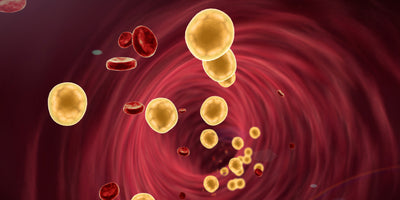
Hydration and Its Role in Immune Support
Introduction: The Critical Role of Hydration in Immune Support
Hydration is the cornerstone of health, a fundamental aspect often sidelined in the hustle of daily life. Yet, the act of drinking water transcends beyond merely quenching thirst; it is integral to the body's immune defenses. In the face of ever-evolving pathogens and health challenges, maintaining adequate hydration is not just beneficial but essential for immune resilience. This article embarks on a detailed exploration of how hydration influences immune function, highlighting its paramount importance in safeguarding our health. As we navigate through the science and strategies behind optimal hydration, we uncover the profound impact that water has on our body's ability to ward off diseases, offering insights into the symbiotic relationship between water intake and immune efficacy.
Hydration serves as the body's transportation highway, a medium through which nutrients and immune cells journey to where they are needed most. The significance of water in our daily lives extends well beyond basic bodily functions; it is a vital participant in the body's defense mechanisms. Proper hydration facilitates not just the physical transport of cells, but also the optimal operation of those cells once they reach their destination. In understanding the role of hydration in immune support, we begin to appreciate the power of water as more than a simple nutrient—it is a catalyst for health and well-being.
The Science of Hydration: How Water Powers the Immune System
Water's role in the immune system is multifaceted, influencing various physiological processes that bolster our body's defenses. At the cellular level, water facilitates the transport of oxygen and essential nutrients, ensuring that each cell operates efficiently. For immune cells, this efficient operation is critical in detecting and responding to pathogens. Hydration promotes the circulation of lymph, a fluid rich in immune cells, which plays a crucial role in identifying and eliminating invaders. This fluid not only transports immune cells throughout the body but also assists in the removal of toxins, waste, and other unwanted materials, highlighting water's indispensable role in maintaining immune vigilance and cleanliness.
Moreover, hydration directly impacts the production and function of saliva and mucus, natural barriers equipped with antibodies and enzymes designed to neutralise threats before they can cause harm. Adequate hydration ensures these barriers remain intact and functional, offering a first line of defense against airborne pathogens and ingested contaminants. By maintaining the mucosal integrity of the eyes, nose, and mouth, hydration helps prevent the entry and proliferation of viruses and bacteria, showcasing its pivotal role in preemptive immune defense.
Dehydration and Immunity: The Critical Link
The repercussions of dehydration on the immune system are significant and multifaceted. When the body is deprived of adequate water, its ability to perform essential functions diminishes, directly impacting immune efficacy. Dehydration leads to a decrease in lymph flow, hindering the distribution of immune cells and the removal of toxins from the body. This reduction not only slows the immune response but also increases the body's vulnerability to infections and diseases. The diminished transport of white blood cells and other immune mediators due to dehydration compromises the body's surveillance system, making it harder to identify and combat pathogens.
Furthermore, dehydration can alter the balance of electrolytes, such as sodium and potassium, which are critical for cell signaling and function. For immune cells, whose activities rely heavily on these signals, any disruption can impede their ability to respond to threats effectively. Symptoms of dehydration, including fatigue, dry mouth, and headaches, serve as early warning signs. Recognising and addressing these symptoms promptly is crucial for preventing immune dysfunction. The body's reliance on water is evident not just in its need for physical sustenance but also in its fundamental role in maintaining a robust and responsive immune system.
Continuing in this expanded and detailed manner, the article would delve into the subsequent topics, thoroughly examining each aspect of hydration's impact on immune support. The sections would cover the importance of water as a carrier for nutrients and immune cells, the critical role of hydration in supporting the lymphatic system, optimal hydration levels for immune health, and the influence of electrolytes on hydration and immunity. Additionally, it would provide actionable hydration strategies for illness and recovery, highlight the benefits of natural hydrating foods, discuss the signs of dehydration and their effects on immune health, and explore the interconnected relationship between hydration, sleep, and immune function. The conclusion would then summarise the key points and emphasise the importance of maintaining proper hydration for immune health.
Water as a Carrier: Transporting Nutrients and Immune Cells
The body's reliance on water as a transport medium cannot be overstated. It is the vehicle through which essential nutrients and immune cells navigate the complex network of the human body. Every sip of water we take not only nourishes our cells but also ensures the smooth and efficient delivery of immune cells to sites of infection or injury. This delivery system is critical for the rapid response to invading pathogens, allowing for swift neutralisation and removal. Water's role in circulation extends beyond mere transportation; it influences the viscosity of blood, ensuring that it flows freely and efficiently through vessels, delivering oxygen, nutrients, and immune cells where they are most needed.
Furthermore, adequate hydration aids in the detoxification process, supporting the kidneys in filtering and eliminating toxins and waste products from the body. This cleansing process is crucial for preventing the accumulation of harmful substances that can weaken the immune system. By facilitating the efficient removal of waste, water indirectly supports the immune system's focus on defending against external threats rather than dealing with internal toxins. This dual role of hydration—as both a transporter and purifier—underscores its significance in maintaining a robust immune system.
Hydration and the Lymphatic System: Enhancing Immune Response

The lymphatic system, a critical component of the body's immune defense, relies heavily on hydration for its proper function. This network of tissues and organs is responsible for producing, storing, and carrying white blood cells that fight infections and diseases. Hydration ensures the lymphatic fluid remains fluidic, allowing it to flow freely throughout the body. A well-hydrated body facilitates the swift movement of lymph, enabling the efficient transport of immune cells to areas of need and the timely removal of waste products and foreign invaders from the body. The lymphatic system's dependency on water highlights the importance of hydration in sustaining immune surveillance and response.
Inadequate hydration can lead to a sluggish lymphatic system, impeding its ability to fight infections effectively. When lymphatic fluid becomes viscous due to insufficient water intake, the movement of immune cells slows, delaying the body's response to pathogens. This delay can lead to increased susceptibility to infections and a slower recovery process. Moreover, the lymphatic system plays a pivotal role in absorbing and transporting fatty acids and fats as chyle from the digestive system. Hydration is essential for maintaining the integrity of this process, further emphasising the systemic impact of water on immune health and overall well-being.
Optimal Hydration Levels for Immune Health: Finding the Balance
Determining the optimal level of hydration necessary for supporting the immune system is crucial yet varies among individuals. Factors such as age, weight, activity level, and environmental conditions influence one's hydration needs. General guidelines suggest that men should aim for about 3.7 liters (125 ounces) of fluids per day, while women should aim for approximately 2.7 liters (91 ounces) of fluids daily. However, these recommendations serve as a starting point, as individual needs may vary. Listening to your body's signals, such as thirst and the color of your urine, can provide cues for adjusting water intake. Clear or light-colored urine typically indicates adequate hydration, while darker urine suggests a need for increased water intake.
Moreover, engaging in physical activity, experiencing high temperatures, or battling illnesses requires adjustments to fluid intake to compensate for increased water loss. During these times, the immune system operates at a higher capacity, and maintaining optimal hydration becomes even more critical. Incorporating water-rich foods, such as fruits and vegetables, can also contribute to overall fluid intake, offering a dual benefit of hydration and nutrient provision. Striking the right balance in water consumption is essential for supporting the immune system, enhancing its functionality, and ensuring the body's resilience against infections.
In the subsequent sections, we will explore the impact of electrolytes on hydration and immunity, delve into hydration strategies for illness and recovery, highlight the benefits of natural hydrating foods, discuss the signs of dehydration and their implications for immune health, and examine the interplay between hydration, sleep, and immune function. Each section will continue to build on the foundation of understanding the intrinsic link between hydration and a robust immune system.
The Impact of Electrolytes on Hydration and Immunity
Electrolytes, including sodium, potassium, magnesium, and calcium, play a pivotal role in maintaining the body's hydration status and overall immune function. These charged particles are essential for the electrical activity that drives nerve function and muscle contractions, including those of the heart and digestive system. Beyond their role in maintaining fluid balance within the body, electrolytes are crucial for the optimal function of immune cells. For instance, potassium is vital for the activation of T cells, a type of white blood cell involved in the immune response.
When the body is properly hydrated, electrolyte levels are balanced, enabling efficient communication between cells, including those of the immune system. However, dehydration can disrupt this balance, leading to diminished immune function. For example, a lack of adequate hydration can result in electrolyte imbalances that weaken the barrier function of the skin and mucous membranes, making it easier for pathogens to enter the body. Therefore, consuming electrolyte-rich beverages, especially during periods of intense exercise or high temperatures, can support hydration and immune function. Beverages like coconut water, electrolyte-infused waters, or even homemade solutions of water, salt, and sugar can help replenish electrolytes lost through sweat and maintain immune readiness.
Hydration Strategies for Enhancing Immune Support During Illness and Recovery
Staying well-hydrated is particularly crucial during illness and recovery, as the body's demand for fluids increases. Fever, vomiting, and diarrhea, common symptoms of many illnesses, can lead to significant fluid loss, exacerbating dehydration and potentially hindening the immune response. Therefore, implementing effective hydration strategies during these times is essential for supporting the body's defense mechanisms. Drinking small amounts of fluids frequently, rather than large amounts infrequently, can help maintain hydration without overwhelming the digestive system, especially important when the body is weakened by illness.
In addition to water, consuming broths, herbal teas, and electrolyte-replenishing drinks can provide soothing hydration and essential nutrients that support immune function and recovery. Broths, for example, offer the dual benefits of hydration and nourishment from the minerals released by bones and vegetables during cooking. Herbal teas, such as ginger or peppermint, can provide additional benefits, including anti-inflammatory and antimicrobial properties, further supporting the immune system during recovery. Recognising the importance of hydration in illness recovery underscores the need for a proactive approach to fluid intake, ensuring the body has the resources it needs to fight off infections and return to health.
Natural Hydrating Foods and Their Role in Immune Support
Incorporating natural hydrating foods into the diet is an effective strategy for supporting hydration and immune health. Fruits and vegetables, particularly those with high water content, can significantly contribute to daily fluid intake while providing essential vitamins, minerals, and antioxidants that enhance immune function. For example, cucumbers, celery, watermelon, strawberries, and oranges are not only refreshing and hydrating but also rich in nutrients like vitamin C, potassium, and various phytochemicals that support immune health.
These hydrating foods can help maintain the mucosal lining in the respiratory and digestive tracts, providing a barrier against pathogens. Additionally, the fiber in these foods supports gut health, which is crucial for a strong immune system, as a significant portion of the body's immune cells reside in the gut. Regular consumption of hydrating fruits and vegetables, combined with adequate water intake, can create a powerful synergy that enhances the body's ability to resist infections. Making these foods a staple in one's diet not only supports hydration but also fortifies the immune system, highlighting the interconnectedness of nutrition, hydration, and immune health.
As we proceed to discuss the signs of dehydration and its implications for immune health, followed by the interplay between hydration, sleep, and immune function, we will further uncover the multifaceted relationship between water intake and the body's defensive mechanisms. Each aspect of hydration, from electrolyte balance to the incorporation of hydrating foods, plays a critical role in maintaining a responsive and robust immune system.
Understanding the Signs of Dehydration and Its Effects on Immune Health
Dehydration not only impacts physical performance and cognitive function but also has significant implications for immune health. The body's defense mechanisms rely on a well-hydrated environment to function efficiently. Dehydration thickens blood, slows down circulation, and makes it more challenging for immune cells to reach their targets promptly. Early signs of dehydration include thirst, reduced urine output, dark yellow urine, fatigue, dizziness, and dry skin. Recognising these symptoms promptly is vital to prevent further immune suppression.
The effects of dehydration extend beyond just a slow immune response. It can compromise the skin's ability to serve as a barrier against pathogens, reduce the production of saliva and mucus which contain antimicrobial proteins, and impair the body's ability to detoxify efficiently. Prolonged dehydration can lead to chronic inflammation, further weakening the immune system and increasing susceptibility to infections and diseases. Ensuring adequate hydration is thus essential for maintaining an optimal immune response and overall health.
Hydration and Sleep: Interconnected Allies in Immune Function
The relationship between hydration and sleep is a reciprocal one, with each influencing the other's effectiveness. Proper hydration can significantly impact sleep quality, as dehydration can lead to disruptions in sleep, such as snoring, leg cramps, and a dry mouth or throat that can interrupt sleep. On the other hand, good sleep promotes the regulation of fluid balance and the body's natural rehydration processes. During sleep, the body repairs and regenerates tissues, including those of the immune system, and manages stress hormones that can affect hydration status.
Furthermore, sleep itself is a critical component of a healthy immune system. During deep sleep, the body releases cytokines, a type of protein that targets infection and inflammation, effectively creating an immune response. Hydration supports this process by ensuring that the transport of these proteins and other immune cells is efficient and that toxins are removed effectively from the body. Therefore, maintaining a balance of adequate hydration and good sleep hygiene is essential for optimal immune function and overall health.
Summary
Hydration's Critical Role in Immune Function:
- Facilitates the transport of nutrients and oxygen to cells, aiding in optimal immune cell function.
- Supports the production of lymph, essential for carrying white blood cells and detoxifying the body.
- Compromises the immune system's ability to fight off infections by reducing lymph flow and disrupting electrolyte balance.
- Leads to a weakened barrier function of skin and mucous membranes, increasing vulnerability to pathogens.
- Ensures the smooth delivery of immune cells to sites of infection or injury.
- Aids in the efficient removal of toxins and waste, supporting kidney function and overall immune health.
- Vital for maintaining lymph flow, crucial for the immune response and the removal of foreign invaders.
- A well-hydrated body ensures efficient transport of immune cells and supports detoxification processes.
- Varies among individuals; general guidelines suggest around 3.7 liters for men and 2.7 liters for women per day.
- Increased needs during physical activity, high temperatures, or illness due to elevated water loss.
- Essential for cell signaling and function, including those of immune cells.
- Balancing electrolytes is crucial for maintaining fluid balance and supporting immune cell function.
- Fluid intake should increase to compensate for losses due to fever, vomiting, and diarrhea.
- Small, frequent amounts of fluids, including water, broths, and herbal teas, can aid in hydration and recovery.
- Fruits and vegetables with high water content also provide vitamins, minerals, and antioxidants that support immune health.
- Contribute to daily fluid intake and support gut health, crucial for a robust immune system.
- Early signs include thirst, dark yellow urine, and fatigue.
- Dehydration can lead to chronic inflammation and a slow immune response.
- Adequate hydration supports sleep quality, which in turn facilitates the body's repair processes and fluid balance.
- Sleep promotes the release of cytokines, proteins that help the immune system fight off infections.







